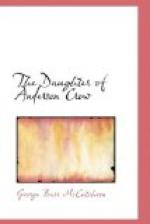And had not Anderson Crow risen to more than local distinction? Had not his fame gone abroad throughout the land? Not only was he the Marshal of Tinkletown at a salary of $200 a year, but he was president of the County Horse-thief Detectives’ Association and also a life-long delegate to the State Convention of the Sons of the Revolution. Along that line, let it be added, every parent in Tinkletown bemoaned the birth of a daughter, because that simple circumstance of origin robbed the society’s roster of a new name.
Anderson Crow, at the age of forty-nine, had a proud official record behind him and a guaranteed future ahead. Doubtless it was of this that he was thinking, as he leaned pensively against the town hitching-rack and gingerly chewed the blade of wire-grass which dangled even below the chin whiskers that had been with him for twenty years. The faraway expression in his watery-blue eyes gave evidence that he was as great reminiscently as he was personally. So successful had been his career as a law preserver, that of late years no evil-doer had had the courage to ply his nefarious games in the community. The town drunkard, Alf Reesling, seldom appeared on the streets in his habitual condition, because, as he dolefully remarked, he would deserve arrest and confinement for “criminal negligence,” if for nothing else. The marshal’s fame as a detective had long since escaped from the narrow confines of Tinkletown. He was well known at the county seat, and on no less than three occasions had his name mentioned in the “big city” papers in connection with the arrest of notorious horse-thieves.
And now the whole town was trembling with a new excitement, due to the recognition accorded her triple official. On Monday morning he had ventured forth from his office in the long-deserted “calaboose,” resplendent in a brand-new nickel-plated star. By noon everybody in town knew that he was a genuine “detective,” a member of the great organisation known as the New York Imperial Detective Association; and that fresh honour had come to Tinkletown through the agency of a post-revolution generation. The beauty of it all was that Anderson never lost a shred of his serenity in explaining how the association had implored him to join its forces, even going so far as to urge him to come to New York City, where he could assist and advise in all of its large operations. And, moreover, he had been obliged to pay but ten dollars membership fee, besides buying the blazing star for the paltry sum of three dollars and a quarter.
Every passer-by on this bright spring morning offered a respectful “Howdy” to Anderson Crow, whose only recognition was a slow and imposing nod of the head. Once only was he driven to relinquish his pensive attitude, and that was when an impertinent blue-bottle fly undertook to rest for a brief spell upon the nickel-plated star. Never was blue-bottle more energetically put to flight.
But even as the Tinkletown Pooh-Bah posed in restful supremacy there were rushing down upon him affairs of the epoch-making kind. Up in the clear, lazy sky a thunderbolt was preparing to hurl itself into the very heart of Tinkletown, and at the very head of Anderson Crow.




